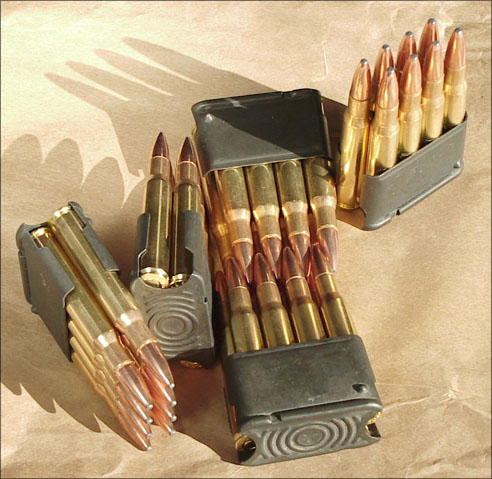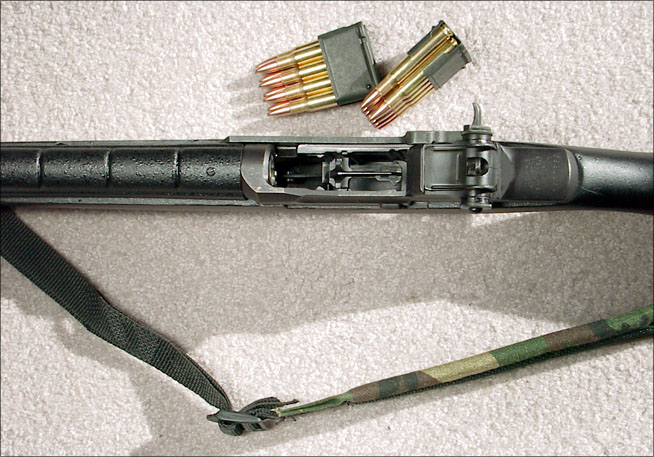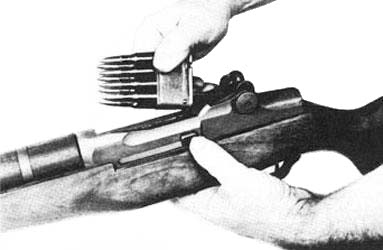

 |
 |
|
|
|
#1
|
||||
|
||||
|
The British would be more likely to use their own design, the Enfield EM-2.
__________________
If it moves, shoot it, if not push it, if it still doesn't move, use explosives. Nothing happens in isolation - it's called "the butterfly effect" Mors ante pudorem |
|
#2
|
||||
|
||||
|
Stalin was so anxious about the possibility of a Western assault following the surrender of Germany that he ordered rail lines across Poland torn up. It’s hard to imagine that the Soviets would have pressed for war against the US, whatever their ideological preferences might have been. Stalin’s advisors would have told him that the strategic situation was intolerable at the time.
The US mainland was untouchable by any weapons the Soviets possessed or were likely to make operational soon, whereas the US possessed a very large fleet of splendid four-engine bombers that could have reached targets in the western Soviet Union from bases in England, the Caucasus from bases in Egypt, and Central Asia from bases in India. All aid to the USSR from the US would have ceased immediately, of course. Stalin knew perfectly well that the US had operational atomic weapons by the time of the Potsdam conference. He also had to have some idea of the vast American industrial capacity.
__________________
“We’re not innovating. We’re selectively imitating.” June Bernstein, Acting President of the University of Arizona in Tucson, November 15, 1998. |
|
#3
|
||||
|
||||
|
If Stalin could have kept the US out of a continuing war.....
__________________
If it moves, shoot it, if not push it, if it still doesn't move, use explosives. Nothing happens in isolation - it's called "the butterfly effect" Mors ante pudorem |
|
#4
|
||||
|
||||
|
Quote:
Possibly, Stalin might have become convinced that the Western Allies were about to kick the alliance to the curb. In this instance, he might have become convinced that the best chance for Soviet success lay in an all-out invasion of Western Europe that would force the US to negotiate peace. He might have known that the US would have had real trouble raising the money to pay for further arms and armaments. He might have gambled that the US would be closer to its point of psychological exhaustion than the USSR. He might have known that the US did not have any more atomic weapons ready for use. He might have figured that control of Germany, the Netherlands, Denmark, Austria, and maybe Norway would present the Allies with too great a task to continue fighting--at least until the Soviets could make their own atomic weapons and delivery systems. Stalin would have been keenly aware that his refusal to make preparations in the face of Nazi preparations led to disaster in 1941. If he became convinced that the Allies were interested in picking up where the Germans had left off, he might very well be predisposed towards pre-emptive action. In this case, he would not have transferred forces to East Asia. He would have left them in Europe and launched an offensive there. I can’t say whether he would have intended to stop at the Rhine or press on into France. It’s hard to say whether he would have gone into Greece or Italy. Stalin probably would have directed forces into Iran, which would have yielded a warm-water port for later use. Soviet forces might have entered the Chinese Civil War, too. It’s hard to say whether and when the Japanese would have surrendered in August 1945 without a Soviet offensive in Manchuria. Equally hard to guess would be the reaction among the Allies. Obviously, the Allies would react with all due vigor to having been attacked. But what would public opinion in the US and the UK be? The UK in particular might have been a spent force at that point. Would the American citizenry be willing to accept another long war? What strategic plan could have been sold to the American people? How would an onslaught by heavily armored Soviet forces have affected the Allies? There is a huge number of unknowns. It would make for some exciting reading, though.
__________________
“We’re not innovating. We’re selectively imitating.” June Bernstein, Acting President of the University of Arizona in Tucson, November 15, 1998. |
|
#5
|
||||
|
||||
|
Quote:
- C.
__________________
Clayton A. Oliver • Occasional RPG Freelancer Since 1996 Author of The Pacific Northwest, coauthor of Tara Romaneasca, creator of several other free Twilight: 2000 and Twilight: 2013 resources, and curator of an intermittent gaming blog. It rarely takes more than a page to recognize that you're in the presence of someone who can write, but it only takes a sentence to know you're dealing with someone who can't. - Josh Olson |
|
#6
|
|||
|
|||
|
Lots of ideas are going thru my brain matter its makin my head hurt in a good way.
US Assualt rifle based on the Haenel / Schmeiiser MKb.42(H) machine carbine Designation M4 and M4a1 with folding stock (posibly in .30 carbine, maybe just keep it in 8mm kurtz though called something like .32 Carbine round) Magazine fed M1 Garand British EM-1 and or EM-2 Sterling SMG Russians would of coarse have the SKS in greater numbers and the AK47 or one of its parallel developed weapons. Gotta get to work.............lots of stuff to decide on. |
|
#7
|
||||
|
||||
|
Just thought
I was watching Patton and then line's hit me, "We should'nt be disarming the Germans, we should be arming and getting them to help us fighting the russians" Give me 24 and we will be at war with them and I'll make look like it was thier fault" Just another option
__________________
I will not hide. I will not be deterred nor will I be intimidated from my performing my duty, I am a Canadian Soldier. |
|
#8
|
|||
|
|||
|
The big problem with the EM2 was its unsuitably for the 7.62mm/.308 round chosen as standard for NATO- this choice being led by the US' huge stocks of this post-WW2, and almost infinite capacity to manufacture more. I suspect that a common ammunition would be desired in most of the scenarios we have outlined.
A magazine-fed Garand would make sense; I have an alternative that might not be technically feasible, and would welcome comments from those who have handled Garands. If the Garand was modified to have a bigger integral box magazine, would it be possible to hold the bolt back when the rifle was (partly) loaded, and recharge using the standard 8-round clips? That way the rifle need never be empty, in the same way that a Lee-Enfield can have its 10-round magazine recharged using the 5-round stripper clip, at any point after firing the first 5. |
|
#9
|
|||
|
|||
|
Quote:
|
|
#10
|
||||
|
||||
|
Just to clarify the situation with the Garand ammunition feed, the clip is not a stripper clip but an en bloc type (AKA charger clip) that is inserted into the rifle in its entirety. It's this clip that causes the 'ping' when the rifle runs empty as the clip is ejected (to throw it clear making way for a loaded clip to be inserted).
There were a handful of other rifles that made use of en bloc clips such as the German 1888 Commission Rifle and other Mannlicher rifles of the era. The following pictures should better illustrate the situation. en bloc clips for the M1 Garand  top of the M1 Garand  loading a Garand with an en bloc clip  
|
|
#11
|
||||
|
||||
|
Quote:
Note also it was US pressure on all the other NATO nations that caused the adoption of 7.62x51 as standard, after the EM-2 was developed. The .280 British round was deemed to be underpowered by the US even though they later adopted (and forced the rest of NATO to adopt) the 5.56x45mm round because the 7.62x51 was found to be overpowered... (as predicted by many at the time). If war with the USSR had broken out shortly after WWII concluded, chances are Britain, along with Belgium (who were also looking at the .280) would have simply moved forward with their plans to field the EM-2 (which had already been type standardised and adopted as the next issue weapon on the 25th of April 1951).
__________________
If it moves, shoot it, if not push it, if it still doesn't move, use explosives. Nothing happens in isolation - it's called "the butterfly effect" Mors ante pudorem |
|
#12
|
|||
|
|||
|
If this post-war plan for Germany had happened there could have been a different country to fight over:
http://en.wikipedia.org/wiki/Morgenthau_Plan Instead the Marshall Plan was put into effect. Two more articles on WWII continuing: http://www.sfsfw.org/a/38/gotterdammerung-part1.php http://www.sfsfw.org/a/39/gotterdammerung-part2.php Part 1 is land, while part 2 covers sea and air war. Last edited by Brit; 06-05-2012 at 01:16 AM. |
 |
| Currently Active Users Viewing This Thread: 1 (0 members and 1 guests) | |
|
|